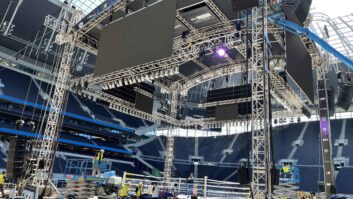While for some it might feel as though the football season has only just ended, the English Premier League kicks off its 2021-22 season on Friday night as newly promoted Brentford host Arsenal.
This season TV coverage of the Premier League will return to pre-pandemic levels, in other words not every match will be shown live. Instead, Sky Sports will broadcast 128 live Premier League matches over the course of the next ten months.
In February 2020, the broadcaster announced its commitment to becoming carbon neutral by 2030, while all Sky Sports host broadcasts gained albert certification in January 2021. Sustainability is clearly a key issue at Sky, and that will continue during the new Premier League season. “During the 2020/21 season, we introduced carbon neutrality, by understanding our footprint and offsetting our carbon emissions,” Jo Finon, manager of responsible productions at Sky Sports tells TVBEurope.
“For 2021/22 we are continuing our remote production set up and carbon neutrality, but we have also introduced a greener fuel into our outside broadcast generator, this means that until we’re able to make the move to shore power, we are reducing our emissions by using a renewable diesel made from food waste. The biofuel will also be used to transport the trucks to the OBs, which is exciting and is further separating our industry from fossil fuels. We are also reviewing our ways of working for our people, making sure our crew feel supported by ensuring that we have mentally healthy productions. I could say more, but you’ll just have to see!” she teases.

Finon oversees “all things sustainable” across all Sky Sports UK departments, including productions on Sky Sports News and Sky Sports Racing, and also Sky’s Production Services department which provides crew and facilities for Sky Sports and other Sky departments.
While a large part of her focus is the environment, her remit also includes issues that could influence productions such as crew wellbeing, inclusive recruitment, modern slavery and also understanding and reducing carbon emissions. “I’ve always been interested in trying to make a difference within my career by improving workflows or working practices and this was a natural extension to that,” she says. “The Sky Ocean Rescue plastic campaign in 2017 was the first significant environmental project I implemented. Removing single use plastic (SUP) from productions showed how we can introduce improvements to our operations and we enjoyed seeing that way of working ripple throughout the industry.”
Even before Sky set its carbon neutral target, the company had implemented procedures to reduce its carbon footprint, including carpooling, the aforementioned plastic removal, and its first OB generator fuel switch in 2018. Another important practice has been working with suppliers to drive further change. “Unlike other genres, sport facilities often have multiple year contracts, so during the RFP process we introduced responsible business questions, to understand where each company is on their journey to be more sustainable,” explains Finon. “We then awarded the contract and introduced responsible business targets, keeping sustainability on the agenda with suppliers, having annual calls to discuss where they are with improvements.”

She adds that it’s “hugely important” for Sky Sports to work with media tech vendors who are also looking at sustainability. “Sky Sports can’t do this on their own, we need to work with our entire supply chain to make changes,” she stresses. “Part of Sky’s overall ambition to be net zero carbon by 2030 is reducing our own and supply chain emissions. We hope that by sharing our knowledge we can encourage all those who work with us to make changes that can help drive us towards a zero-carbon future.
“A lot of sustainability changes have to be implemented at the right time for the organisation, so some changes require setting targets, like updating fleet vehicles etc,” Finon continues. “On Sky Sports contracts as we often have multiple year deals, this allows us to review changes over the term. In February 2020, Sky Sports also introduced our Green Travel policy and we had no idea the pandemic would hit us the following month.
While Finon stresses Covid has been devastating for so many people, it has helped accelerate the roll out of remote production at Sky Sports UK. “We had already begun this journey in October 2019 with the Football League moving to a remote workflow, but for the safety of our crew, Sky Sports introduced remote productions on Premier League a lot quicker than we had planned. Of course, some of the measures introduced due to Covid saw increases in car journeys or PPE, however, we know that these are necessary measures and hope to get back greener when possible.”

She adds that the team is always looking at the workflows and how they can reduce emissions, including staff training. “We also like to share what we’re up to, as these improvements are for the greater good and we want to help our colleagues at other broadcasters reduce their emissions too. We are also committed to using our voice to discuss climate change on air to our customers, as we have a unique position to reach a demographic who may yet appreciate how climate change will influence their lives, and we will do this in an authentic way, only discussing when it’s relevant to the event.”
Sky Sports is also busy implementing sustainability targets across its other football coverage: “Anything we’re introducing for the Premier League we ensure is readily available for other sports. We try to be consistent with our productions, so what you see on EPL should also be on EFL, SPFL and WSL, plus all our other sports, where possible,” states Finon.
Timeline of Sky Zero achievements since February 2020:
February 2020 – Sky announces commitment to become net zero carbon by 2030
June 2020 – All Sky Originals from 2019 onward now certified CarbonNeutral® in the UK
July 2020 – Sky Sports become first broadcaster to sign up to UNFCCC’s Sports for Action Framework
July 2020 – Sky Sports confirmed as founding member of BAFTA albert Sports Consortium
July 2020 – Work begins on Sky Studios Elstree which will become the most sustainable film and TV production site in the world when it opens in 2022
September 2020 – Sky Sports announces all Premier League, EFL and Transfer Deadline Day live broadcasts will be BAFTA albert certified
October 2020 – Jeremy Darroch and Sky receive the inaugural MIP SDG Award presented to media companies for their action and contribution to delivering the UN’s Sustainable Development Goals.
November 2020 – Sky announces arrival of 151 new PHEV engineer vans that emit 60% less emissions.
January 2021 – Sky announced as Principal Partner and Media Partner for COP26
January 2021 – Sky publishes series of bold new environmental commitments for its TV productions with all Sky Originals to adhere to Sustainable Production Principles and Planet Test.
January 2021 – All Sky Sports host broadcasts to be albert certified productions
January 2021 – First fully electric commercial vehicles join the Sky fleet and Sky joins EV100
January 2021 – Sky News confirmed as a founding member of the albert news consortium
March 2021 – Launch of the £2m Sky Zero Footprint Fund campaign
April 2021 – Sky News launches The Daily Climate Show, first daily news programme dedicated to climate change and the environment.
July 2021 – Sky achieves 100% renewable electricity target and publishes method behind Scope 3 emission reporting







